

Big Data Troves Stay Forbidden to Social Scientists - NYTimes.com. Video: The Truth About Online Reputation. In Ad Network Nightmare, Microsoft Making 'Do Not Track' Default for IE 10. Microsoft announced Thursday that the next version of its browser, IE 10, will ship with the controversial “Do Not Track” feature turned on by default, a first among major browsers, creating a potential threat to online advertising giants.
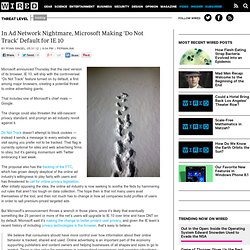
That includes one of Microsoft’s chief rivals — Google. Location Apps: 4 Privacy Settings You Need to Know. Kate Brodock is executive director of digital and social media at Syracuse University, where she leads efforts in the space.
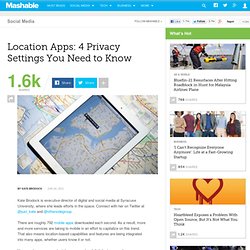
Connect with her on Twitter at @just_kate and @othersidegroup. There are roughly 792 mobile apps downloaded each second. As a result, more and more services are taking to mobile in an effort to capitalize on this trend. That also means location-based capabilities and features are being integrated into many apps, whether users know it or not. Dr. Cranor on "Do Not Track" & the Improbability of Complete Privacy. If there truly is no privacy on the Web, then how can we be shocked by reports of a privacy breach?
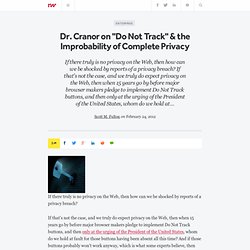
If that's not the case, and we truly do expect privacy on the Web, then when 15 years go by before major browser makers pledge to implement Do Not Track buttons, and then only at the urging of the President of the United States, whom do we hold at fault for those buttons having been absent all this time? And if those buttons probably won't work anyway, which is what some experts believe, then just who is it being fooled by whom? "People are holding out the same hopes for Do Not Track that they held out for P3P 15 years ago. It's definitely a whole déjà vu thing here," says Dr. Lorrie Faith Cranor, in the second part of her interview with ReadWriteWeb.
The White House report (PDF) stops short of calling Do Not Track (DNT) the answer to consumer privacy issues. Self-Regulation: The Sequel. Microsoft Won't Back Down On Offering 'Do Not Track' By Default In Internet Explorer. Should Companies Be Able To Monitor Our Use Of Their Products For Our Own Good? Reading the Privacy Policies You Encounter in a Year Would Take 76 Work Days - Alexis Madrigal - Technology. One simple answer to our privacy problems would be if everyone became maximally informed about how much data was being kept and sold about them.

Logically, to do so, you'd have to read all the privacy policies on the websites you visit. A few years ago, two researchers, both then at Carnegie Mellon, decided to calculate how much time it would take to actually read every privacy policy you should. First, Lorrie Faith Cranor and Aleecia McDonald needed a solid estimate for the average length of a privacy policy. The median length of a privacy policy from the top 75 websites turned out to be 2,514 words.
A standard reading rate in the academic literature is about 250 words a minute, so each and every privacy policy costs each person 10 minutes to read. Some Really Good Points About Ad Cookies & Privacy. Last week's online privacy fracas-of-the-week was about the revelation that Google (and other advertisers) had learned to circumvent Safari's settings to let third-party cookies track users more easily.
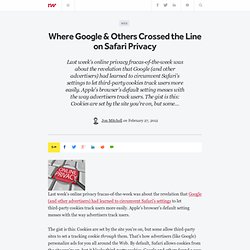
Apple's browser's default setting messes with the way advertisers track users. The gist is this: Cookies are set by the site you're on, but some allow third-party sites to set a tracking cookie through them. That's how advertisers (like Google) personalize ads for you all around the Web. By default, Safari allows cookies from the site you're on, but it blocks third-party cookies. There is no such thing as anonymous online tracking. A 1993 New Yorker cartoon famously proclaimed, "On the Internet, nobody knows you're a dog.
" The Web is a very different place today; you now leave countless footprints online. You log into websites. You share stuff on social networks. You search for information about yourself and your friends, family, and colleagues. Peacemaker: Lauderdale police put trouble spots under surveillance - South Florida Sun-Sentinel.com. “Right to be forgotten”: How Facebook, Google, and other companies can protect Internet user privacy. Ron The great paradox of today's Internet is that the Web feels less and less orderly, even as technology companies preach the virtues of control.

Take Facebook: It has recently been caught hosting photos that its users had asked it to delete three years ago. Last year, a bug in its security system made the private photos of its founder, Mark Zuckerberg, publicly accessible. Or take Anonymous, which keeps releasing personal information of private citizens and public officials, with the goal of making broad political statements or just having fun. Or take Path, a popular social network, which was recently caught uploading members' mobile phone contacts to its servers. Stealth Search Engine Offers Private Internet Browsing. The Spark of Genius Series highlights a unique feature of startups and is made possible by Microsoft BizSpark.
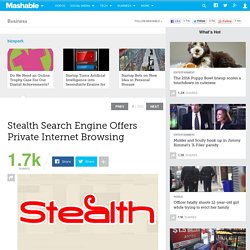
If you would like to have your startup considered for inclusion, please see the details here. Name: Stealth Quick Pitch: Search the web anonymously Genius Idea: Stealth is a search engine that does not store cookies, track IP addresses or save search terms. Your internet footprint can be minimized with a new stealthy search. The Stealth search engine allows users to search the Internet without being trailed by cookies and other tracking devices.
Mobile Apps for Kids: Current Privacy Disclosures are Disappointing. Your Online Privacy Is Worth Less Than A Six Pack Of Marshmallow Fluff. Identity & Trust: The Keys to the Game in Winning the Hearts (and Wallets) of the Consumer. It seems like only yesterday RWW's own Marshall Kirkpatrick wrote the foreword to a book discussing the new ecosystem, business models and value chains in a hyper-connected world.
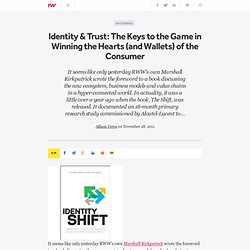
In actuality, it was a little over a year ago when the book, The Shift, was released. It documented an 18-month primary research study commissioned by Alcatel-Lucent to assess the market potential of various network APIs - including presence, profiling and location, among others - across an ecosystem of developers, advertisers, consumers and enterprises. IT Business - Business Advantage through Technology - Channel Recent News. The companies offered a glimpse at the work required to try to stay on top of data privacy issues Executives from Microsoft (Nasdaq: MSFT)and Google on Thursday gave a glimpse into the size of their privacy organizations, which are required for the companies to try to avoid running foul of complicated U.S. privacy regulations and prepare for changes coming to privacy laws around the globe.
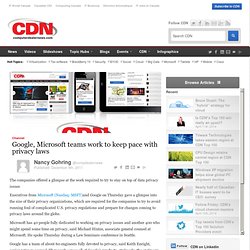
Microsoft has 40 people fully dedicated to working on privacy issues and another 400 who might spend some time on privacy, said Michael Hintze, associate general counsel at Microsoft. Good to Know – Google. If you’re the tablet owner, touch Settings → Users → Add user or profile. Touch Restricted profile → New profile, then name the profile. Use the ON/OFF switches and settings to manage access to features, settings, and apps. Press the Power button to return to the lock screen, then touch the new profile icon. A New Year for Privacy: The PRC Launches Online Complaint Center. Copyright © 2012-2014Privacy Rights Clearinghouse Posted January 3, 2012 The Privacy Rights Clearinghouse (PRC) is proud to announce the launch of an interactive online complaint center designed to serve as a clearinghouse for consumer privacy complaints.
This builds upon our 19-year history of troubleshooting consumers’ complaints and questions regarding a wide variety of information privacy issues, including background checks, debt collection, data breaches, financial information, and online data brokers. The PRC's staff will review and respond to every complaint, providing individuals with information and strategies to address their problem. Harsher data protection sanctions are coming. When Apollo wanted to stop Laokoon from warning the Trojans that there were Greek soldiers in the famous Trojan Horse, he sent two giant snakes to kill Laokoon and his sons. Talk about sanctions! Have we considered using killer snakes to punish data protection violations and to discourage future bad practices? Do Privacy Rights in Electronic Communications Exist?
The Challenge of Creating Web-Based Identity Standards. John Fontana is the identity evangelist for Ping Identity and editor of the PingTalk Blog. Prior to joining Ping, he spent 11 years as a senior editor at Network World. Google, Facebook, Yahoo and others all want to be your identity platform on the web. But while it’s certainly convenient to have one credential for multiple websites, many would argue these services are only secure enough to access your grandmother’s online recipe book. Growing numbers of technologists, IT executives, organizations and governments believe an identity authentication model must establish set standards. The PII Problem: Privacy and a New Concept of Personally Identifiable Information. How Private Is Your Email? It Depends. Hide captionSome big-name tech companies are asking Congress to step in and clarify Americans' online privacy rights. Protecting a Cellphone Against Hackers. Don't Want Your Private Data to Leak? Jailbreak Your iPhone.